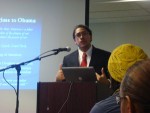Title
As part of the Liberal Arts department’s speaker series, Neil Roberts, assistant professor of Africana Studies and faculty affiliate of political science at Williams College, presented a compelling lecture titled “Frederick Douglass and Barack Obama: Fugitive Refashioning of American Democracy,” in Juilliard’s new Writing Center on February 20.
Body
Roberts, who holds a Ph.D. in political science from the University of Chicago, is the recipient of fellowships from the Andrew Mellon Foundation and Social Science Research Council, and is a member of the Caribbean Philosophical Association board of directors. His present writings deal with the intersection of Caribbean, continental, and North American political theory with respect to theorizing the concepts of freedom and agency.
Roberts began his lecture by saying that even if one does not care about American abolitionist and statesman Frederick Douglass (1818-1895), it is probably safe to say that he or she has an opinion on Barack Obama. Expressing his discomfort with the intense comparisons being made between President Obama and Abraham Lincoln, Roberts suggested that people were perhaps a little too quick to make those connections; after all, George W. Bush, in his glory days, was also compared to Lincoln. The first work to explore the connection between Douglass and Lincoln was just published in 2007. Roberts takes another step and suggests that, since Douglass was compared to Lincoln and Lincoln was compared to Obama, perhaps Douglass might be connected to Obama.
According to Roberts, we must first discuss how we think about democracy. The word itself originates from two Greek roots: demos, or “people,” and kratia, or “rule, strength.” Interestingly enough, as Roberts pointed out, if you look at Plato’s Republic, the original Greek word that was used actually means “constitution.” There was an elite conception of how citizens were viewed; for example, Aristotle is now viewed as representing high philosophy, whereas in his day he was technically a resident alien. In other words, Aristotle was never actually a citizen of Athens, and therefore would not have been able to vote—he only lived and worked there.
Even before Obama won the primaries, he seemed invincible, just as Frederick Douglass, who was also biracial, was “the one” in his time. Roberts remarked that, like Douglass, Obama is a biracial black leader who has culturally adopted his African-American heritage. But what makes him different is that he represents a multiracial America.
As expressed in his narratives, Frederick Douglass saw that there was a difference between “in fact” and “in form.” Form relates to moral psychology, or how you view yourself regardless of the law, while fact refers to the actual law itself. Douglass writes about being a free man in fact, versus being a free man in form. In his life, he made the transition from being a slave by law, as well as in his own view of himself, to legally being a free man and seeing himself as such. In between these two extremes, Douglass went through a period when he was legally a slave, yet he thought of himself as a free man. Even today, individuals are constantly faced with moments in which their identity is challenged, and people can accept many different kinds of identity. Roberts summed it up in his remark: “Some people are free in the law but they are enslaved to their own ill wills.” The most ideal situation, he said, is to be free in fact and in form, but even today, this can be a challenge.
At the conclusion of the lecture, an audience member asked Roberts how he felt President Obama would feel about this connection to Douglass. Scholars (and Obama himself) have pushed the Lincoln-Obama comparison too far, in Roberts’s opinion—for his inauguration, Obama requested the same Bible on which Abraham Lincoln was sworn in—but even so, the president didn’t mention Lincoln anywhere in his acceptance speech, and in terms of actual principles, the connection isn’t explicitly clear. How does it serve us to say that Obama is like Lincoln, when the markets are collapsing and the arts are continuing to be devalued? Besides rhetorical appeal, Roberts said, he is not sure what this comparison to Lincoln does besides suggest a figure that can lead a country at a trying time.
“Power concedes nothing without demand. It never did and it never will,” said Frederick Douglass in 1857. There must be a struggle before there is progress, and Douglass understood this, just as President Obama recognizes it today. Roberts quoted President Obama’s election victory speech from November 4, 2008: “If there is anyone out there who still doubts that America is a place where all things are possible, who still wonders if the dream of our founders is alive in our time, who still questions the power of our democracy, tonight is your answer.”





